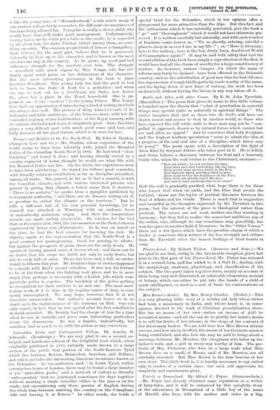Trooper and Redskin in the Far North - West. By John G.
Donkin. (Sampson Low and Co.)—Mr. Donkin, whose experience of the world seems to have been tolerably wide, joined the Mounted Police of the Canadian North-West in 1884. He had tried " clod- breaking " and found it slow ; and having already served in a cavalry regiment at home, thought he would see what life with the Mounted Police was like. On the whole, his experiences seem to have been satisfactory. He found his fellows good comrades, with friendly relations established, as far as discipline permitted, among all ranks. His quarrel, so far as he has a quarrel, is with the Canadian climate, and with various interested persons who persist in giving that climate a better name than it deserves. "There is no malaria," he quotes from a pamphlet published by Government authority, "and there are no diseases arising out of, or peculiar to, either the climate or the territory." But he tells a different tale of his own personal knowledge, for he himself was attacked at Winnipeg with an endemic fever of undoubtedly malarious origin. And then the temperature records are made unduly favourable. He vouches for the fact that on December 21st, 1884, the thermometer on the Saskatchewan registered 62° below zero (Fahrenheit). As he was on march at the time, be had the best reasons for knowing the fact. He objects, again, to the representation that the North-West is a good country for grain-growing. Good for grazing, be allows ; but against the prospects of grain there are the early frosts. He speaks of having passed acres of frozen wheat ; and there can be no doubt that the crops are liable not only to early frosts, but also to early falls of snow. There has been such a fall, we under- stand, in Alberta this year. Mr. Donkin's time of service happened to coincide with Riel's second rebellion. It was not his fortune to be at the front when the fighting took place, and he is more angry than perhaps is necessary with a foolish joke which com- pared the police to coyotes. The hardship of the police getting no recognition for their services is no new one. The most meri- torious work, if it is done in the regular course of duty, is com- monly unrecognised. We may hope, however, that it is not therefore unrewarded. Our author's account leaves us in no doubt as to the righteousness of the sentence on Riel. One can only regret, in fact, that he was spared after his first rebellion to do fresh mischief. Mr. Donkin had the charge of him for a time when he was in custody, and gives some interesting particulars about his demeanour. He was a fanatic, undoubtedly, but ambition had as much to do with his action as any conviction.


















































 Previous page
Previous page